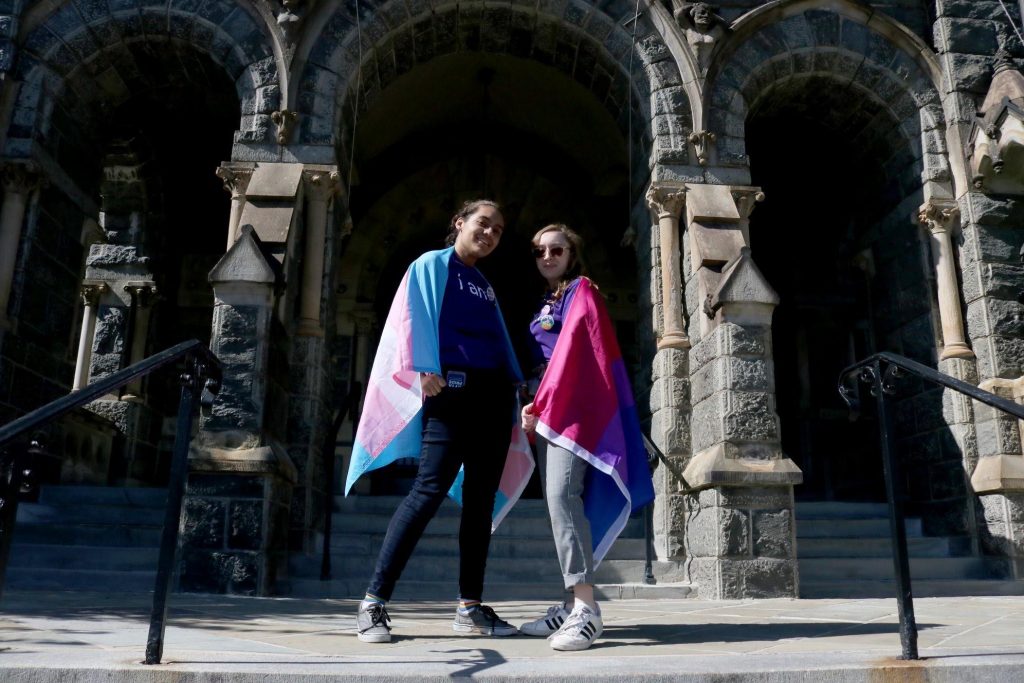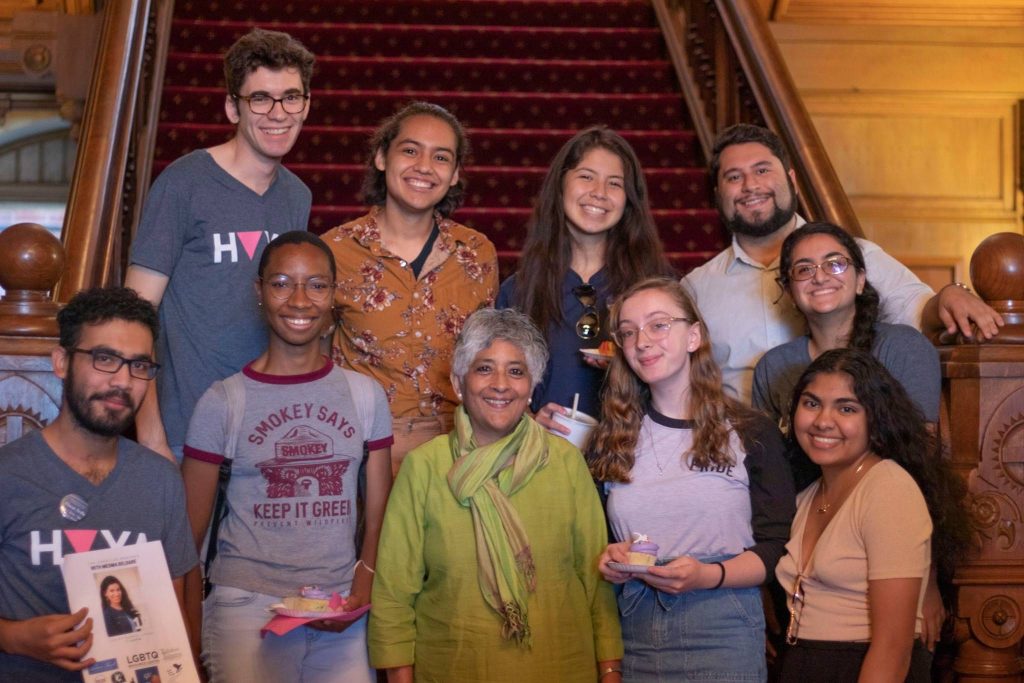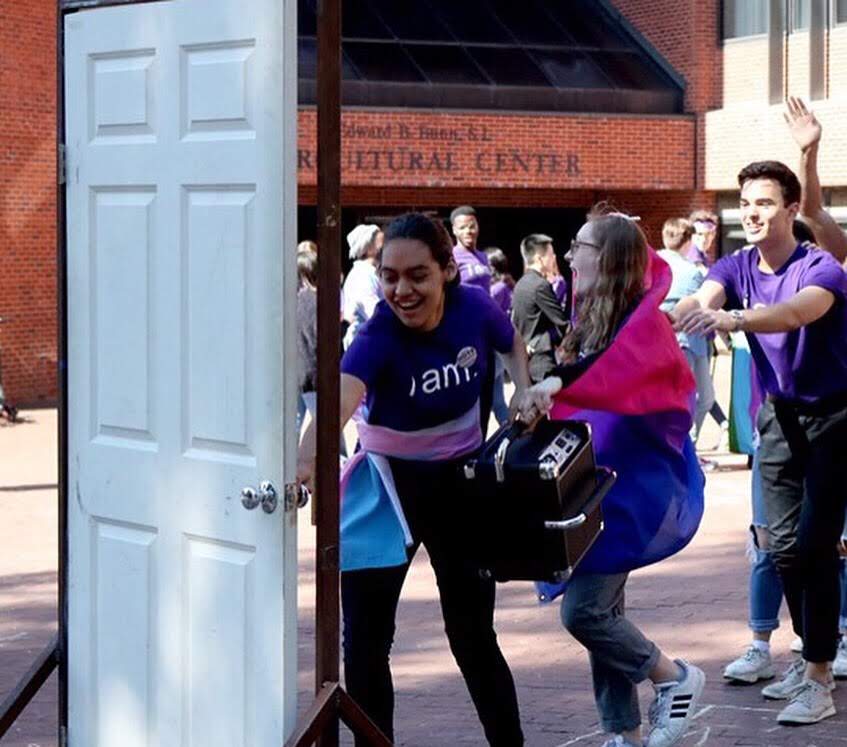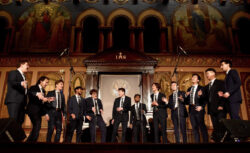One by one, the students walk through the door frame sitting in the middle of Red Square. Some laugh and smile, posing for pictures and hugging their friends. Others step to the other side casually or hurry through on their way to class. A few stop, breathe in deeply before stepping through the door that seemingly leads to nowhere. Each is wearing a purple shirt reading “I am.”
This is Georgetown’s National Coming Out Day celebration, held this year on Oct. 11th as part of OUTober 2019, a month of LGBTQ+ focused events put on by the LGBTQ Resource Center, the Tagliabue Initiative for LGBTQ Life, GU Pride, GU Queer People of Color, and Georgetown LGBTQ Mentors & Resources. OUTober began as a university-wide coming out week in 2009 after the formation of the LGBTQ Resource Center and has occurred every year since 2011.
At a Catholic university such as Georgetown, overt displays of pride are neither expected nor common for many students. OUTober exemplifies the vibrant LGBTQ+ population on campus, and their desire for recognition of both their identities and their place as part of the university community.
Events range from expressions of pride like Coming Out Day, to educational events like a visit to a Newseum exhibition on Stonewall, to conversations about sexuality, gender, and belonging at Georgetown. They approach the intersectionality of the LGBTQ expereince, and are centered around student driven initiatives.
This is Haley Wierzbicki’s (COL ’21) third OUTober. Though she has experienced the month as a new freshman, a member of the GUPride board, and an employee of the resource center, its significance has remained the same for her. “This mission of the month is definitely to create a defined community space in celebration of LGBTQ heritage on campus and in a broader context,” she said.
Since OUTober takes place during the second full month of classes, students are made aware early on in the school year that there is a thriving LGBTQ+ community on campus. As a freshman, Wierzbicki was introduced to the LGBTQ+ community on campus during the month long festivities. “It was the reason that I even ended up involved in Pride my freshman year and now work at the center, having that really big display from the get go,” she said. “It’s an immediate display to say we are here and we belong on this campus.”
Al Castillo (SFS ’22), the co-president of GUPride, expressed that just the presence of such a celebratory and accepting series of events was meaningful, especially in a political climate that can often be hostile to LGBTQ+ individuals. “OUTober, and anything that celebrates the LGBTQ+ community is a step towards accepting and supporting a community that has been marginalized and discriminated against for a large part of human history, ” he said.
This progress is especially significant on Georegtown’s campus, where discrimination against LGBTQ+ students has been historically prevalent. For GUPride to gain university recognition in 1987, they had to bring their case to the D.C. Court of Appeals, which ruled the university had to recognize the group. A series of anti-gay incidents in the late 2000s, including at least three assualts of students, prompted strong responses from the student body, including a march on Healy Hall. The LGBTQ+ Resource Center only celebrated its tenth anniversary last year. There have been at least two hate crimes motivated by sexual orientation bias in the last three years, according to the annual security report.
Siena Hohne (COL ’22), co-president of GUPride, stressed that queer students have rarely had the security and opportunity be open about their identities, much less celebrate them, and feels this history is integral to understanding the LGBTQ community’s place on campus. “It’s important to remember that though we do have a pretty significant presence on campus now we didn’t always have this kind of bargaining power with the university,” Hohne said. “As important as it is to spend OUTober celebrating, we are reminded that our rights are being threatened everyday.”
On Nov. 1, the Trump administration removed nondiscrimination rules for sexuality and gender identity in Health and Human Services programs, including applications to house foster children. This was only the latest move from an administration that has prohibited trans individuals from serving in the military presented cases to the Supreme Court that would roll back the application of sex discrimination law to LGBTQ+ people.

Courtesy of GUPride GUPride co-presidents Siena Hohne and Al CastilloCourtesy of GUPride
Castillo stressed that while OUTober is a month of celebration, students should not pretend they do not face challenges because of their identities. “Sometimes I feel like it masks that reality a little bit,” he said. I think underneath the layers of celebration, the facilities, the being out and proud vibe, there is still a stark reminder that we have a whole lot to do.”
Beyond Coming Out Day, GUPride also presents other events throughout the year, including their popular staging of the Rocky Horror Picture Show on Nov. 1. A shadow cast of students took the stage, enthusiastically dancing along the actors in the movie. Though most students had never seen the movie before, they quickly got into the spirit, all standing up to do the “Time Warp” along with the performers.
While she finds joy in the upbeat and celebratory events, Hohne hopes they are not the only events people attend, and that they can take away from the month. “I think there’s a tendency to rainbow wash our history,” she said. “I would just hope that every student who showed up to Rocky Horror would show up to the Trans Day of Remembrance.”
Though Coming Out Day and Rocky Horror are certainly the events that receive the most attention from the student body, Hohne and Castillo highlighted the impact of some of the more intimate events, especially Come Out, Speak Up, an open mic style event in which students were given a space to share coming out stories, or any other stories about queer identity. Castillo saw this event as a space on which students could “come out” in a potentially more substantial or meaningful way. “We wanted to accommodate those who may not be explicitly out or aren’t comfortable in a more party or exuberant setting.”
Hohne said her role was to make sure the events were impactful to the students. “GUPride focuses on community building, activism, and social events, and a lot of our role in OUTober is making spaces for students that are more more student centered, ” she said. “Our goal is to ensure there is student to student interaction,” Castillo added. GUPride adds new events each year to make the month more inclusive, and this year, incorporated a celebration of International Pronouns Day on Oct. 21.
For Wierzbicki, the variety of events is what makes it so special. “Something student groups and the center both struggle with is what kinds of events will actually create a community space — is it dialogues, is it speakers, is it chill community spaces where people can just show up, ” she said. “OUTober gives groups and the center space to do all of that and account for everyone.”
The keynote speaker for the Center, Mesma Belsaré, a dancer brought in conjunction with Rangila, spoke not just about LGBTQ+ issues, but about artistic expression and presentation in an event on Oct. 10. “It was not just about being queer, it was about being queer and an artist and being queer and trying to navigate what you want to do with your life,” Wierzbicki said.

Courtesy of GUPride Students and LGBTQ Resource Center staff in Healy Hall.Courtesy of GUPride
Castillo believes one of the most impactful events was the Mass of Belonging organized by Campus Ministry, which aimed to resolve the tension many queer students of faith feel between their identities and their religions. “The Catholic church should be a place you feel welcomed in, it is a place you are welcomed in, I undertsand many queer students dont feel that way,” Castillo said. “But you belong here no matter your sexuality and gender identity, who you love, who you identify as. Seeing this event take place for students who feel their sexuality or gender conflict with their faith or beliefs is such an inspirational thing to see on this campus.”
The Catholic Church as an institution has a historically complicated relationship with LGBTQ+ issues. “The Catechism of the Catholic Church,” a text which contains dogmas and teachings of the Church, names “homosexual acts” as “intrinsically immoral and contrary to the natural law,” and names “homosexual tendencies” as “objectively disordered,” according to the Human Rights Campaign. The church does not recognize same-sex marraige, and prohibits LGBTQ+ people from joining the clergy.
Castillo said he had trouble reconciling his identity with his faith, but never felt felt that struggle was acknowledged by the church. “It was something I had never seen before, something I struggled with growing up,” he said.
When Wierzbicki first stepped onto campus, she was not sure what her experience at Georgetown would be like, given her sexuality. “I think especially being on a Catholic campus, I think about my time as a freshman not really knowing what it was going to be like, being queer and being at Georgetown,” she said.
For many students, including Castillo, OUTober is the first answer to that question. “When you see OUTober taking place at Georgetown, a Jesuit university, when the Catholic Church has not been friendly to queer people in general, you see that you can find that communtiy, you can find a space where you belong,” he said. “People feel more comfortable coming out of their shells, out of the closet, they want to be their true authentic selves, and OUTober is a way to be able to show that true self.”








[…] Castillo, co-president of GU Pride, told student news magazine, The Georgetown Voice, that the most impactful part of this year’s […]